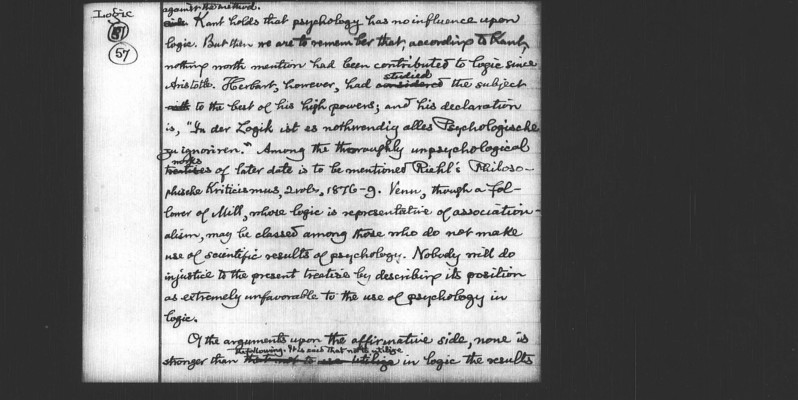Pages
56
Logic 56 On the Science of Psychology
Krug and Teser to mention only those whom English reader are likely to know something and evry subsequent German philosopher Baader Tichte Schelling Hoegel Sohleier macher Schopenhauer von Hartmann Duhring down to Haskel has been followed by his train of logicians. Thus a large proportion of all the logics that have even been written have more or less pursued thisvicious order of thought. 5th Considerable controversy has taken place as to whether scientific results of psychology ought ot ought not to be admitted among the premises from which logical principles are to be deduced. Upon the affirmative side are the Wolfiam logicians and many others older and newer. J.S. Mill (Examination of Hamiliton xx.5th.Ed.p.461) pronounces tha5t "its [logics] theoretic grounds are wholly borrowed from Psychology." A smaller but more powersul force is arranged
57
Logic 57
against the method. Kant holds that psychology has no influence upon logic. But then was are to remember that according to Kant nothing worth mention had been contributed to logic since Aristotle. Herbart however had studied the subject to the best of his high powers and his declaration is "In der Logik ist es nothwedig alles Pyschologische zu ignoriren." Among the throughly unpsychological works of later date is to be mentioned Riehl's Philosopische Kriticismus 2 vols 1876-9. Venn though a follower of Mill whose logic is representative of associationalism may be classed among those who do not make use of scientific results of psychology. Nobody will so injustice to the present treatise by describing its position as extremely infavourable to the use of psychology in logic. Of the arguments upon the affirmative side none is stronger then the following. It is said that not to utilize in logic the results
58
Logic 58
which psychologists have obtained concerning abstraction and concerning association would be a wasteful proceeding. It is also maintained that precepts setting forth how we ought to reason can have no rathional basis except the science of the laws which describe how we must reason and that in fact if this latter part of logic which is at the same thime a part of psychology be dropped out the purely normative part which remains is nothing but an ancillary practical art. The general answer to all this is that it only illustrated the dire confusion brought into both sciences when they are not so understood as to be widely distinct from one another. The logicians of the period from Descartes to Kant cannot be much blamed for seeing little distinction between psychology and logic in as much as the psychology of their days whether rational or empirical consisted in little else than a
59
Logic 59
logical analysis of the products of thought as every psychologist of our day will admit. Even the pupils of James Mill for all the power of his extraordinary 'Analysis of the Human Mind' were far from unstanding psychology as it is now understood. Modern psychology has made an admirable beginning. Every student of exact science who is in a situation to judge of what has been accomplished in this department must applaud it with his whole heart. Yet that it is only a beginning is shown by its present tendency to turn upon its axis without making any great advance. Matters of brain physiology and matters of consciousness elbow one another in unsympathetic juxtaposition in a way which can only be trnsitional and is a sign for us as well as we can look forward to conceptions not yet attained that psychologists do not yet understand what mind
60
Logic 50
is not what it does. I am not at all prepared to clear the matter up but I dimly decern I think that the physiological view has not sufficiently affected the introspective aspect and possibly the converse is true also. Perhaps the introspection is mainly illusion due to quasilogical interpretations but let man not be understood as having much faith in current Wundtian monism. At any rate however it is pretty clear that there must be an application of scientific logic in order to separate the precipitate of physiology from the filtrate of logic. In this state of things or in the real state of things which I am perhaps very mistakenly endeavoring to peer into it ought i think to be admitted that psychological conceptions are not sufficiently matured to afford a safe foundation for any part of logic and it seems still more evident that it is very much




